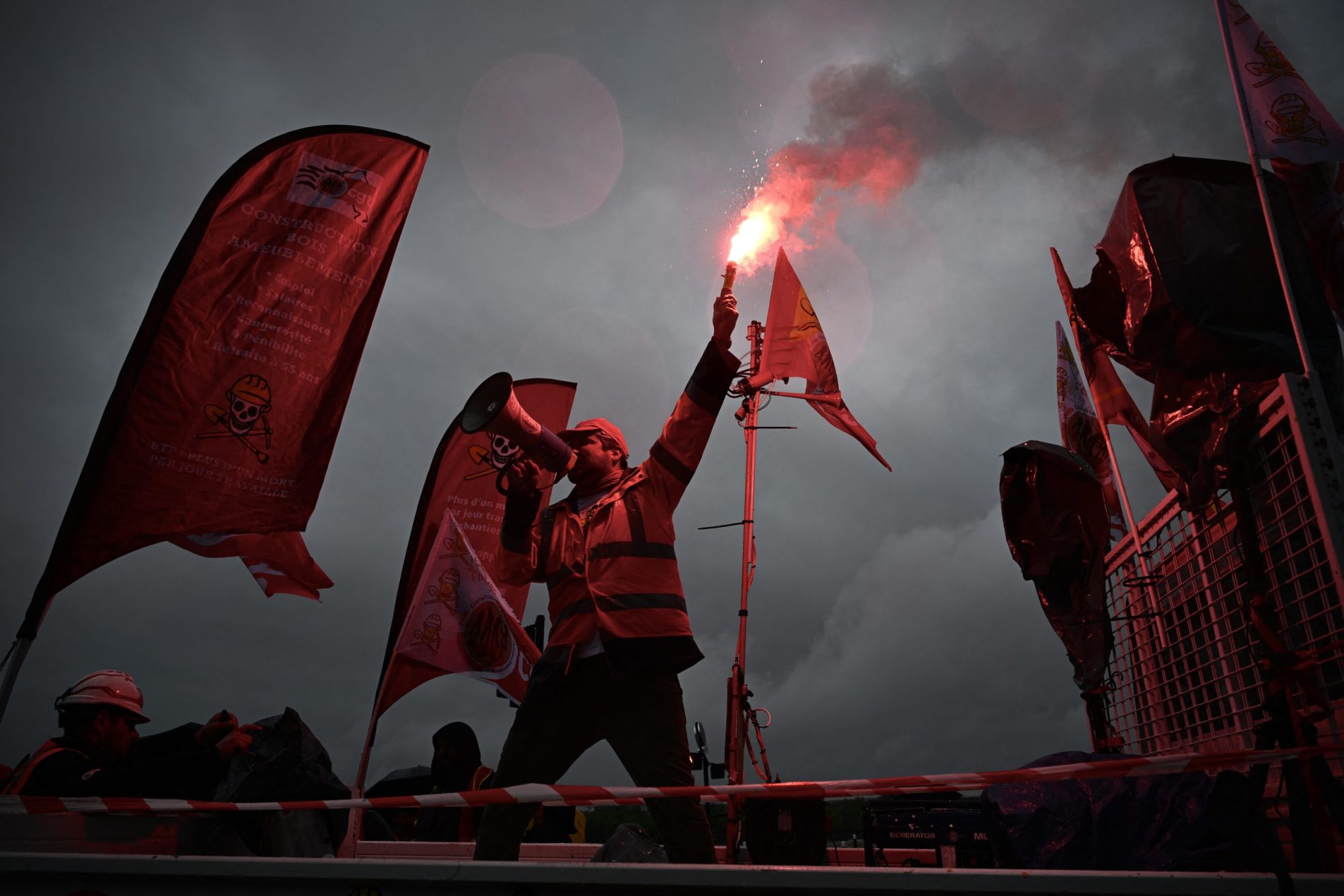There are always two sides to the Olympics: the glamor of the games broadcasted throughout the world, and the gritty reality of evictions, anti-homeless sweeps, and securitization faced by local working people. The Paris 2024 games have been no exception to this uglier side, but it’s also been an occasion for French unions to score victories. Axel Persson, General Secretary of the CGT Rail Workers Union, explains how French workers used the impending Olympics to their strategic advantage in collective action, and how workers in Los Angeles can draw on these lessons ahead of the 2028 Olympics.
Studio Production: Jules Boykoff
Post-Production: David Hebden, Adam Coley
Transcript
Dave Zirin: Hey, this is Dave Zirin from Edge of Sports TV, only on the Real News Network, and I’m thrilled to be speaking to Axel Persson right here in Olympic Paris. Axel Persson is a rank and file labor leader with the Railway Workers Union. Axel, thank you so much for joining us.
Axel Persson: Thank you.
Dave Zirin: First things first, Axel. I was hoping you could share with our audience a story that hasn’t gotten a lot of attention, and that’s how the workers of France were able to pressure the government for concessions in the lead-up to the Olympics. Can you speak about that?
Axel Persson: Yeah. For example, in my industry specifically — Unfortunately this cannot apply to all industries to be fair — But in my industry and others, for example, as a transport industry, the railway industry, we managed to force through a deal saying very simply and putting a very simple message saying that, if you don’t give into our demands in a satisfactory manner, there will be no Olympics.
Because, as in any of these events, these events can only happen if workers make them possible, whether it be transport workers, hotel workers, restaurant workers, all the workers who run the city, basically, who make it a livable place. If we’re not here to do the work, there can be no such a thing as these events.
We said, we have demands, and if you don’t cave into them, we will strike at these occasions. So in industries such as mine, for example, the railway industry, already back in April after several 24-hour strikes that paralyzed the network, we managed to force through a deal that gave back not all of the ground we have lost, but that, for example, allowed me and my colleagues to retire earlier despite the fact that the government had forced through pension reform in 2023.
To make things a bit understandable for the wider audience, I, for example, in my personal situation, will be able to retire at 53 with a full pension. My demand being, our demand being 50, so we haven’t gotten there yet, but we’ve gotten closer.
We’ve also managed to secure a deal, after a few strikes, that basically doubles our pay during the Olympics period, which we found not necessarily satisfactory in the terms that we thought that more people should have been covered by the deal, but quite a lot of the transport workers in Paris are covered by the deal, and so we have benefited from raises in the wages.
But the gist is, and the lesson to be taught, is that in order to force through your demands, you have to wield your industrial muscles and strike, threaten or strike, be good on your threats when you do it because without our labor, nothing can be done. And they have no choice but to give into our demands because they can only comment on society. They can only give their opinion, but without our labor, nothing can be done. That is not the case of our enemies who rule the society. They’re the real parasites, not us.
Dave Zirin: Yeah. Also, because you work for the Railway Workers Union, I do need to ask you about what happened before the Olympics, if you had any thoughts about that, the sabotage that took place on the train lines that prevented thousands of people from coming into Paris. A story that has seemed to be wiped off the front pages in the whole fever around the Olympics here.
Axel Persson: Yeah, for the opening ceremony of the Olympics last Friday, so on the 26th of July, if I remember correctly, there was this organized, coordinated sabotage that took place at four different places in the territory very far away from each other, where groups of people basically arsoned installations that are vital for the railway network, which led to major disruptions.
Out of these four attacks, one was thwarted in the sense that there were colleagues, railway workers who were doing maintenance work, spotted these people, and when they saw them, these people fled. The perpetrators fled.
As things stands now, well, the disruptions were minimized by the fact that, for once, we were not understaffed because of the Olympics. So actually the disruptions were important, but were managed to be resolved and treated actually quite quickly by industry standards. Within the day after, things have started getting back to normal, which is actually quite a feat given the spread of the damage that had been done.
But nobody knows exactly who did this. There are many people and forces speculating on who did this. Of course, the right is pointing towards what they call the ultra left, but no group has claimed the attack.
There’s been an anonymous group that have expressed support for the attack, but has not claimed it. It can very well be a foreign power given the current geopolitical situations with rivalries between the different powers and Russia with the war in Ukraine and France standing with NATO countries against Russia. It could be foreign interference, destabilization, or it can be any other reason.
Nobody knows for now. The inquiry hasn’t yielded results yet, but maybe it will at one point. But for now, unfortunately, nobody knows who and why they did it.
Dave Zirin: Now we’re here at Père Lachaise Cemetery, a famous place here in Paris, and we’re just steps away from the Wall of the Communards.
Axel Persson: Yes.
Dave Zirin: I’m asking all of that because, at the Olympic opening ceremonies, they paid tribute to someone named Louise Michel, but they didn’t exactly give a lot of context to who Louise Michel was. I was hoping perhaps you could.
Axel Persson: Yeah. So Louise Michel is a very famous political figure in France. She’s a woman and a teacher who was a leader of the Paris Commune, one of the many leaders of the Paris Commune.
The Paris Commune in itself is widely acknowledged to be the first worker state. It was very, very short-lived because it arose and was born in a very peculiar context in France, in Paris, actually, in 1871. It was a consequence of an uprising of the French working class in Paris that seized power, kicked out the ruling class of Paris, and administered the city in an autonomous fashion and instituted workers’ democracy, direct democracy, voting rights for all the workers, even immigrants, because they said nationality doesn’t matter. What matters is if you work or not, forbid the child labor, forbid the prostitution, which heralded a lot of the social rights the working class still benefit from today.
It was very short-lived in the sense that it was completely crushed, very violently so, by the newborn third French Republic that arose after the second empire led by Napoleon III, and it was crushed almost in a genocidal fashion. Some people qualify it as a genocide, some qualify it as a massacre, but that’s pretty irrelevant. It was a massacre which ended up in 15,000 to 50,000 depending on the estimates, of workers being randomly executed in the streets of Paris.
The last stand these commune fighters managed to take was in this cemetery. And in one of the walls here of the cemetery that we call the Communard Wall or the Wall of the Federates, [inaudible] the same place, and the last one was executed there. So you can still see the bullets where the last one was executed.
Since then it has become acknowledged that this part of the cemetery more or less belongs and is administered by the radical labor movement, so mainly the CGT Trade Union of which I am a member and representative of, but also the French Communist Party, given the very importance and weight and influence it had in the working class.
So that’s where all, not all, but many of the heroes of the French working class are buried or where monuments paying tribute to their memory and to their fight, their legacy, are here. Not all of them, but quite a lot of them.
History is gazing upon you when walk through these areas going back from the Paris Commune to all those who were deported and exterminated by the Nazis and those who fought for the liberation of the working class and also from the liberation of Nazism.
So I find it a very interesting place, and very often when we have international guests, such as you, we insist on taking you to visit it because it’s part of the history that is less taught in history books, and it is only taught by the working class. So that’s why we insist on bringing… I know it may sound a bit peculiar to people when they hear it, no, we insist. We have to meet at the cemetery, but there’s a reason for it.
Dave Zirin: So the Olympic organizers, just to put a fine point on it, paid tribute in front of a global audience.
Axel Persson: Exactly.
Dave Zirin: To one of the leaders of the first successful revolutionary workers state in world history.
Axel Persson: Exactly. Exactly.
There’s also a funny anecdote about this I mentioned to you a bit earlier is that I don’t remember if it’s a footage or if it’s just a picture, but there’s an anecdote, at least, of Lenin, the Russian revolutionary who danced in the snow in the winter of 1918. The people asked him, comrade Lenin, why are you dancing? Tovarishch Lenin, why are you dancing? He said, you didn’t notice, but it’s been 72 days now since we’ve seized power, and the Paris Commune lasted for 71 days. So ourhistorical purpose has been filled. We managed to last one day longer.
This is also why the Paris Commune — And we actually saw that before, there were Chinese people who came here and took pictures in front of that area — Working class organization from all over the world, even the US, from Africa, from Asia, from Central Asia, from Iran. Everywhere across the world, people from the working class movement come to the cemetery to pay tribute to the heroes of the Paris Commune.
Dave Zirin: Amazing. One last question for you, Axel. 2024 Olympics here in Paris, 2028 in Los Angeles.
Axel Persson: Exactly. Exactly.
Dave Zirin: A place with a real labor movement.
Axel Persson: Yes.
Dave Zirin: There is strong labor movement in Los Angeles by US standards.
Axel Persson: Yes. Yes, I know.
Dave Zirin: I’m hoping that perhaps you could give some advice to the labor movement, to the radical workers’ movement of Los Angeles about what they should do when faced with the Olympic monolith.
Axel Persson: Well, I’d like to start by giving a very personal shout out and hi to all my friends in the Roofers Union, LA Roofers Union Local 36, because they’re in Los Angeles, as the name indicates. But I know they’re not alone because, as you said, Los Angeles has a very strong labor movement by US standards, and what applies in Paris and Los Angeles is pretty much the same.
Events such as these will only be made possible if transport workers show up, if those who build the facilities will do it, if those who will take care of the tourists who come there in the hotels, who will eat at the restaurants, if they show up, the event will be able to happen. If you decide to not do it, if you decide to withdraw your labor, things will not be possible because we make the wheels of society turn.
The advice I would have to give is that use that power. We have the power, we just need the conscience and the awareness that we have that power, and we have to wield it. So put forth your legitimate demands. I’m not saying you have to wait until the Olympics in 2028 because, of course, if you have an opportunity to do it now, you have to do it now.
But when the time comes, use it as leverage to bring forth and force them to give into your demands, whether it be over wages, over public services. Any demands you have, it will be an occasion to turn this into an opportunity for the working class to rise up and set forth their demands.
I think the most important is that the working class wins their own medals, and those medals are measured by other standards than those of the capitalist state. It’s measured in terms of workers’ rights, wages, pensions, and just the right to live in a dignified manner out of the fruit of our labor. That’s what I would have to say.
Dave Zirin: Wow. Hey, Los Angeles, go for that gold medal in striking.
Axel Persson: Exactly.
Dave Zirin: What do you think? Okay [laughs].
Axel Persson: I would agree completely to that. [Speaking French], as they say in France —
Dave Zirin: [Speaking French].
Axel Persson: Which means long live to the strikes.
Dave Zirin: Axel Persson, thanks so much for joining us [crosstalk].
Axel Persson: Well, thank you for being here. It was a pleasure.






